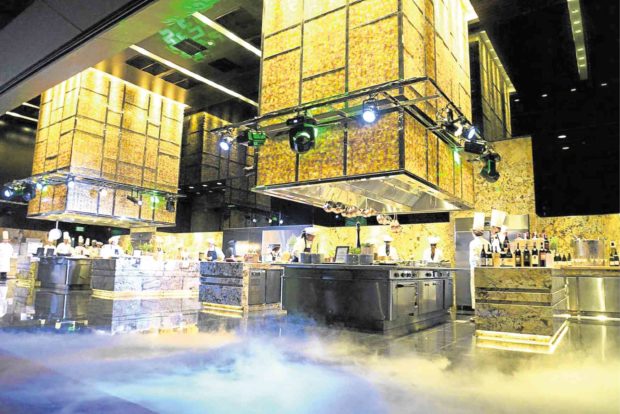European food fest coming to town
It’s only August but this event next month is too big not to mention yet.
On Sept. 10 to 16, the EU-Philippines Business Network (EPBN) together with the European Union and the European Chamber of Commerce in the Philippines (ECCP) will be holding a ginormous culinary event called European Culinary Week.
How massive will it be? The events will be held not only in Manila but also in Cebu. Fourteen award-winning chefs, including Michelin-starred, will participate.
There will be six main events:
1) The European Culinary Cooking Demo on Sept. 10 and 11
Here, students of the Alain Ducasse Institute Philippines at Enderun Colleges will experience interactive cooking demos. The lucky aspiring young chefs will be mentored by award-winning chefs to produce a one-course meal using special produce from Europe that have geographical indication (more about this below). This event is open to the public.
2) The European Culinary Geographical Indication Lunch and Exhibit, Sept. 10 from 10 a.m. to 2 p.m.
This is a by-invitation only event, unfortunately, to be held at the Grand Hyatt’s Ballroom III and Show Kitchen. The 5-course lunch will be prepared by European award-winning chefs to showcase the importance of geographic indication and create an awareness of this system.
3) The European Culinary Charity Dinner, Sept. 10
This is a five-course meal prepared by European award-winning chefs to raise funds for two chosen causes: The Lighthouse Club and the Chosen Children Village Foundation. This is open to the public.
Tickets for the charity dinner are priced at P10,000 each. VIP tickets are also available at P25,000, which gives the guest free flowing champagne and a complimentary copy of the European Culinary Week Recipe Book with recipes from various Philippine-based European chefs such as Marc Chalopin of Alain Ducasse Institute, who hails from France, and Colin Mackay of Blackbird, who hails from Scotland; as well as Michelin-starred chefs such as Francesco Brutto of Undicesmo Vinera in Italy and Oscar Calleja of Annua San Vicente de la Barquera in Spain.
Remember that these two wonderful charities will benefit from your gourmet katakawan. Eat well so that others may live well.
4) The European Culinary Week Exclusive Lunch and Dinner, Sept. 11
The lunch and dinner are, unfortunately, exclusive. This by-invite event is for dignitaries, government officials and companies.
5) Culinaria on Sept. 12 from 5:30 p.m. to 10 p.m.
Culinaria, the culminating event in Manila, will present all the European award-winning chefs together in the open kitchen of the Grand Hyatt’s Grand Ballroom. Each chef will prepare one hot and one cold dish that will be paired with different drinks. Tickets are available at P7,000 per head while VIP tickets (you get free flowing champagne and a complimentary copy of the European Culinary Week Recipe Book) are at P9,900 per head.
6) European Culinary Weekend, Sept. 14-16, Cebu
After Manila, the celebration will continue in Cebu. It will be at the Crimson Hotel & Resort in Mactan.
Geographical indications
Beyond satisfying hungry palates and today’s food lovers’ hedonistic glutton tendencies, the European Culinary Week also seeks to send a message about trade. The organizers want to spark interest in European cuisine and products and encourage both European and Philippine companies to import these here.
The event also seeks to raise awareness on geographical indications, a system used in Europe to let consumers identify where a product originated from, i.e., the territory, region, locality, country.
The purpose of this is not just to identify where something comes from but also to indicate the quality and reputation of a product.
“We have a unique way of trying to protect well-known products,” EU Ambassador Franz Jessen shares. “To take a very straightforward example: Champagne. We all know what champagne is when we buy a bottle in the supermarket and we know that because it’s a name and a brand, that through geographical indication, is protected. The champagne inside the bottle is produced according to a certain criteria, in a certain geographical area.”
Jessen says this is good not only for consumers but also for producers, because they can then make sure the product is sold with the premium it deserves.
This also works as protection for food producers. The reputation and potential of a producing community is also uplifted, thus promoting socioeconomic development.
Jessen notes the Philippines can explore a similar metric because of its range of local products, such as Bicol’s pili nuts, Davao pomelos and Guimaras mangoes. This is something that our own Department of Trade and Industry should explore. After getting a geographical indication, prices potentially increase twofold, such as Cambodia’s Kampot pepper.
Guenter Taus, EPBN steering committee chair and ECCP president, invites everyone to join in the festivities. “Through events such as this, businesses from both sides will be able to come together and establish potential partnerships to further both economic and cultural relations between the EU and the Philippines,” he says.
For more information, visit europeanculinaryweek.comor contact landline (02)832-8121 or e-mail [email protected].















